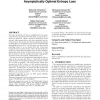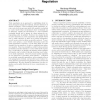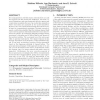546 search results - page 17 / 110 » On the Power of Secure Two-Party Computation |
120
click to vote
STOC
2010
ACM
15 years 2 months ago
2010
ACM
We study the problem of "privacy amplification": key agreement between two parties who both know a weak secret w, such as a password. (Such a setting is ubiquitous on th...
114
click to vote
WPES
2003
ACM
15 years 4 months ago
2003
ACM
Trust negotiation is an approach to establishing trust between strangers through the bilateral, iterative disclosure of digital credentials. Under automated trust negotiation, acc...
ASIACRYPT
2004
Springer
15 years 4 months ago
2004
Springer
Secret handshakes were recently introduced [BDS+ 03] to allow members of the same group to authenticate each other secretly, in the sense that someone who is not a group member ca...
120
click to vote
WISEC
2010
ACM
15 years 4 months ago
2010
ACM
Key management in wireless sensor networks does not only face typical, but also several new challenges. The scale, resource limitations, and new threats such as node capture and c...
ASIACRYPT
2008
Springer
15 years 1 months ago
2008
Springer
Abstract. In secure computation among a set P of players one considers an adversary who can corrupt certain players. The three usually considered types of corruption are active, pa...



